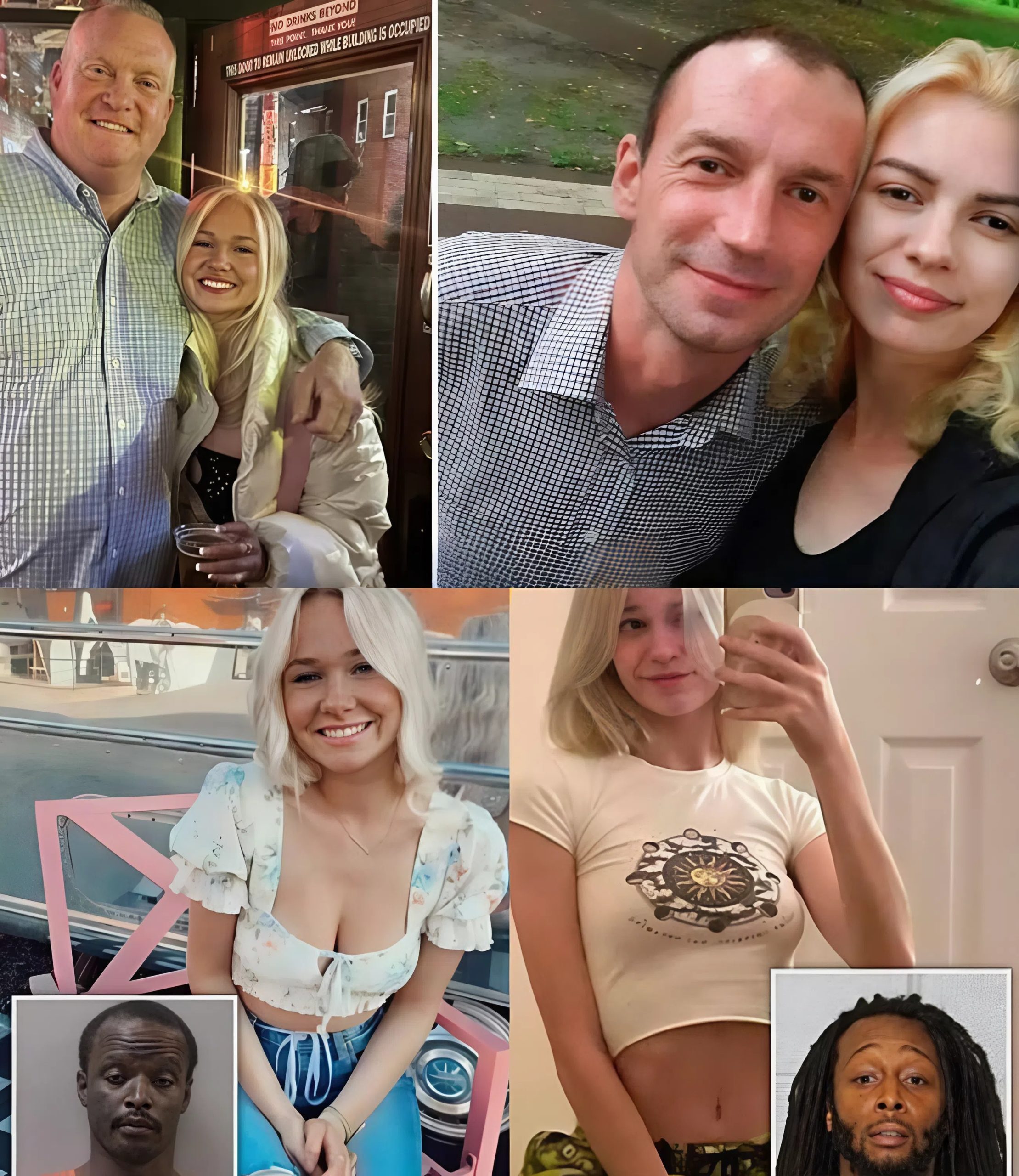The tragic story of Iryna Zarutska, a Ukrainian war refugee, who sought safety in the US only to meet a devastating end. This sad story is a stark reminder of the far-reaching consequences of the ukraine war and the ever-present threat of crime. The news highlights the heartbreaking fate of a young woman seeking refuge.
On an ordinary evening, Logan Reese, 17, sat in her bedroom, phone in hand, her heart pounding with an instinctive fear that would prove prophetic. Thousands of miles away, Iryna Kovalenko, 23, an ambitious Ukrainian exchange student with dreams of changing the world, laced up her sneakers for a routine evening jog in suburban Illinois. In different towns, different continents, two young women moved through the world with bright eyes and untainted hope. Within hours, both would be violently taken from life, leaving behind grieving families, shattered communities, and two fathers’ anguished cries echoing in the corridors of collective consciousness.
What happened to Logan and Iryna is more than personal tragedy. It is a glaring indictment of a justice system that repeatedly allowed dangerous men to walk free — men who exploited every opportunity to strike again. Their stories are intertwined by negligence, systemic failure, and the cruel randomness of a society that sometimes places abstract ideals over human life.

The Terrifying Final Moments
For Logan, the danger became tangible in a single, heart-wrenching phone call to her father, David Reese. At 9:42 p.m., his daughter’s voice trembled across the line:
“Dad… I’m scared. Someone’s following me.”
Those words, simple yet piercing, would haunt him forever. Within minutes, Logan’s life was extinguished. She was found hours later, brutally strangled and beaten. Her killer, Ethan Voss, was a convicted violent offender who had been released early after serving just half of his sentence. The legal system had deemed him rehabilitated, but he returned not to society, but to destruction.
Meanwhile, Iryna’s final moments were recorded not through a phone call, but via the silent data of her fitness app. Her last jog, a sequence of running steps that once symbolized vitality, abruptly ended. Marcus Cole, also a repeat offender on parole, was responsible. He had previously stalked women, yet he walked free until he encountered Iryna. The stark reality is chilling: both young women were victimized not by chance, but by a preventable failure of justice.
The Human Cost of Early Release
These cases expose a systemic tension between the ideals of rehabilitation and the imperative of public safety. In recent years, many U.S. states have embraced early release programs under the banner of criminal justice reform — intended to reduce overcrowding, cut costs, and offer a second chance. But Logan and Iryna’s stories reveal the brutal calculus of error: the cost of misjudgment is irreparable.
David Reese, still trembling with grief and rage, confronted the press:
“They said he had changed. They said he deserved another chance. My daughter deserved that chance — not him.”
Yurii Kovalenko, speaking through tears from Ukraine, echoed the same sentiment:
“I sent my daughter to America to study safely. Now I bring her home in a coffin.”
These fathers’ words are stark indictments of a system that prioritized abstract policies over individual lives. The pain of losing a child is unimaginable; the betrayal of knowing it might have been preventable compounds it beyond measure.

Patterns of Repeat Offenders
Logan and Iryna’s deaths were not random. They fit into a dangerous pattern: repeat offenders released early who reoffend with devastating consequences. Both Voss and Cole had criminal histories that should have flagged them as high-risk. Their release illustrates a tension between mercy and accountability, between optimism about human rehabilitation and the real-world evidence of recidivism.
Research consistently shows that repeat violent offenders have a disproportionately high chance of committing further crimes after release. Yet, policy decisions often overlook these statistics in favor of cost-saving or ideological arguments. Logan and Iryna were not statistics; they were living, breathing individuals whose dreams were destroyed because the system gambled with their lives.
The Psychological Impact on Families
The trauma inflicted on the families cannot be overstated. Fathers, in particular, often bear an intense societal expectation to protect, and when they cannot, the psychological burden can be overwhelming. David Reese describes sleepless nights replaying his daughter’s final words, the helplessness of answering her call for help, and the searing awareness that the law had failed them. Yurii Kovalenko recounts the torment of a father’s instinct to shield his child colliding with the cruel reality of global injustice.
Psychologists studying parental grief highlight that losing a child violently is associated with higher rates of PTSD, depression, and long-term emotional scarring. But beyond statistics, these are personal stories — fathers left to wander through daily life carrying a pain that has no end. Their cries are desperate, raw, and profoundly human: a soundscape of grief and anger that refuses to be silenced.
The Societal Reckoning
The outrage has been immediate and intense. Social media is alive with demands for legislative reform, petitions advocating “Logan’s Law” and “Iryna’s Promise,” and public demonstrations demanding stricter parole protocols. Many citizens question how society continues to gamble with life, allowing dangerous individuals back into the community under the assumption of rehabilitation.
The question that burns in the public consciousness is simple: How many more children, students, and dreamers must die before the system prioritizes public safety over theoretical second chances? Logan and Iryna’s names are no longer private tragedies; they have become symbols of systemic failure and the urgent need for reform.

Dreams Interrupted
Logan’s ambition was to become a pediatric nurse — a life dedicated to healing others. Friends described her as radiant, empathetic, and full of promise. Iryna aimed to be a journalist, amplifying the voices of the marginalized and fighting for women’s rights in her native Ukraine. Both young women were visionaries in their own way, their dreams not just personal ambitions but contributions to the greater good.
By removing them, the killers extinguished more than lives; they erased potential, silenced possibility, and deprived society of individuals who might have made profound impacts. Their deaths leave a vacuum filled with grief, anger, and moral questioning.
The Moral Imperative
The larger lesson from these tragedies extends beyond legislative debates. They challenge society to reconcile ideals of justice, mercy, and human safety. Compassion, while noble, cannot be blind. Policies designed to give offenders a second chance must also rigorously evaluate the risk they pose to society. Logan and Iryna were not afforded that evaluation. They were victims of a system that allowed hope for perpetrators to outweigh protection for the innocent.
Fathers’ Cries as a Call to Action
David Reese and Yurii Kovalenko have turned grief into advocacy, unwilling to let their daughters’ deaths be forgotten. They are rallying lawmakers, raising public awareness, and demanding accountability. Their cries, tinged with despair yet fueled by determination, serve as a clarion call: a plea that no other parent should endure this pain.
“Let their names not be lost,” David urged.“Let justice finally speak,” Yurii added.
The urgency of their calls transcends national borders. These are not merely local tragedies but universal warnings. When society fails to protect its most vulnerable, the consequences ripple outward, leaving collective moral scars.

Conclusion: A Nation’s Reflection
The deaths of Logan Reese and Iryna Kovalenko are stark reminders that justice is fragile, mercy is complicated, and life is finite. They force society to confront uncomfortable truths about parole, recidivism, and the balance between rehabilitation and protection. Most importantly, they remind us that behind every policy, every law, every decision, real lives hang in the balance.
Fathers’ cries — raw, desperate, and unending — will haunt the conscience of a nation until action is taken. Logan and Iryna’s dreams were stolen, their futures erased, but their stories have the power to ignite change. The challenge is whether society will finally listen — not just to the words of lawmakers or analysts, but to the voices of the innocent silenced too soon.
Until then, their names remain etched in grief, their cries echoing in memory, and their tragedies a stark warning that the cost of failing the innocent is far too high to ignore.



